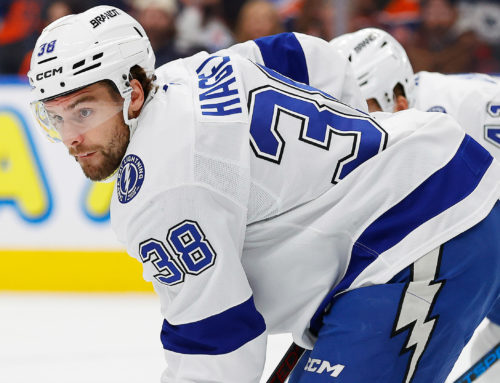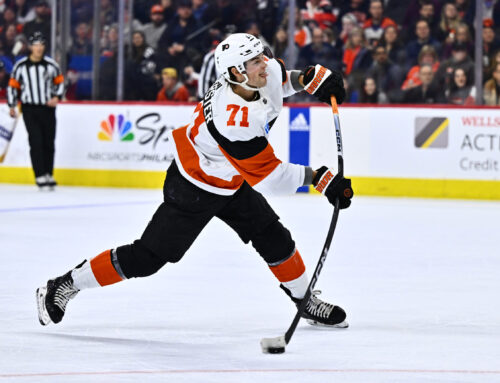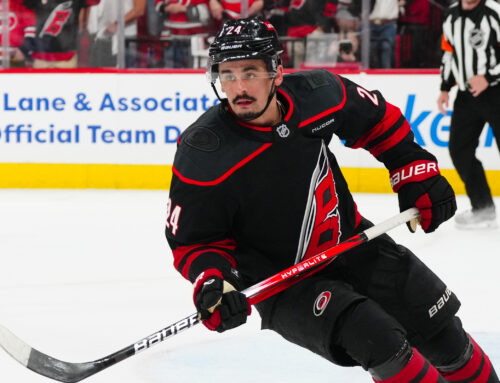This week's Eastern Edge is the second part of a series we started last week, looking at how players performed in new surroundings this season. Throughout this series, we'll discuss players that joined new teams ahead of the 2021-2022 regular season, as well as those that were traded during the year. It's timely that this week's installment covers three Hurricanes, who were just eliminated by the Rangers on Monday. Last week’s can be viewed here.
The Danish netminder had an excellent debut campaign in Carolina. He was one of the league's best goaltenders this season, posting a sparkling 35-14-3 record, 2.17 GAA and .922 save percentage. Unfortunately, he suffered a lower-body injury in mid-April which ended his regular season early and kept him sidelined for all 14 of Carolina's playoff games. Andersen dealt with a significant knee injury last season, so there is some concern this could be a chronic issue that hinders him going forward. Obviously, there's no official word that this injury is related to last year's knee problem, but we should get more information now that the Hurricanes have been eliminated from the playoffs.
Injury concerns aside, I wouldn't target Andersen in next year's fantasy drafts. Assuming he's healthy for the start of next year, he'll be a top target in all formats based on his strong 2021-2022 regular season. Goaltending is rarely consistent from season to season, and I'm not eager to spend a top draft pick on such an unpredictable commodity. As I've said before, I'd rather use my top picks on skaters, who tend to show more season-to-season consistency, and snag an underappreciated goalie in the mid-rounds. This year, that strategy helped me build a strong offense before securing Jakob Markstrom, Sergei Bobrovsky, and Tristan Jarry in rounds 8, 12, and 15 of a 10-team league. Even if your mid-round goalies flop, it's a lot easier to stay afloat when your mid-round picks struggle, than when your early-round picks struggle.
The 26-year-old defenseman was productive in his first season with the Hurricanes, tallying 51 points in 64 appearances. That translates to 65 points over 82 games – a similar rate to the one he posted during his 2019-2020 breakout with the Rangers. In both that season and this one, DeAngelo's overall numbers were bolstered by strong power-play production. He tallied 20 points with the man advantage this year, enjoying a 68% share of Carolina's total power-play time. Currently a restricted free agent, DeAngelo needs a new contract for next season. I think he'd be inclined to stay with Carolina since the Hurricanes were one of a few teams willing to take a chance on him this year, despite well-documented character issues. From the team's perspective, DeAngelo fills the archetypes of offensive defenseman and power-play quarterback – roles which aren't easily filled by the team's other blueliners. The key pieces of Carolina's power play – Teuvo Teravainen, Sebastian Aho, and Andrei Svechnikov – are all on contract for next year. As a result, the top unit should stay intact, giving DeAngelo the opportunity to score at a similar rate in 2022-2023.
Following a disappointing 2022 playoff performance that saw him tally just two points in 14 games, public perception of the young forward is currently quite low. Some are already calling him a bust, but I think it's way too early to make such a conclusion. Sure, he's been in the NHL for four seasons now, but he's still just 21 years old. He had a promising rookie campaign in Montreal, posting a 35-point pace. Unfortunately, he struggled in his next two years as a Canadien, pacing for 18 points in year two and 29 points in year three. Kotkaniemi managed a respectable 36-point pace this season – his fourth year in the NHL and his first with the Hurricanes. It's an improvement from his final years in Montreal, but I guess it wasn't drastic enough to overshadow his recent playoff struggles. I think it's important to mention that Kotkaniemi skated just 12 minutes a night with the Hurricanes this past season – a significant downgrade from the 15 minutes he averaged last year with the Habs. His role on the power play was also reduced. He held a 42% share of Montreal's total power-play time last year but saw just 26% of Carolina's total time with the man advantage this year.
Now, the reduced role was slightly offset by the luxury of facing slightly weaker opponents, but his offensive zone deployment was pretty much the same as last year, so he wasn't used in a more scoring-focused role. In addition, he was shuffled throughout the lineup and spent most of his minutes alongside depth players (Derek Stepan, Jordan Martinook, Steven Lorentz). All this is to say that he wasn't placed in an ideal situation. I'm not saying he should've been placed in a better situation, but I am saying his production may improve in the future as (1) he develops, (2) he sees a greater volume of ice-time and (3) he gets to play with better linemates for a sustained stretch. If the Hurricanes part ways with unrestricted free agent Vincent Trocheck during the offseason, Kotkaniemi could see his role expand next year.
During his time in Montreal, Kotkaniemi's skating and balance were often glaring weaknesses. I haven't had a chance to evaluate whether those things have improved since he joined the Hurricanes, but I think he'll need to take big strides in those areas if he's going to be an impact player in the NHL.





 FLA
FLA CHI
CHI NYR
NYR PIT
PIT L.A
L.A COL
COL UTA
UTA BOS
BOS BUF
BUF SEA
SEA NYI
NYI VAN
VAN MIN
MIN TOR
TOR
